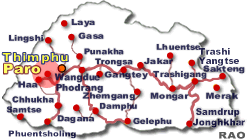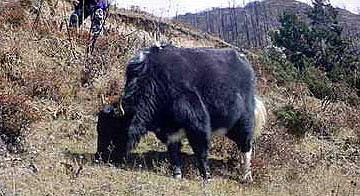 |
Bhutan's
Economy: Yak Farming |
|
 |
Bhutan's
Economy |
|
|
 |
| Paro:
Dwindling demand for yak butter |
 |
 |
Of
the numerous taxis that zip around Paro town, two are driven by yak
herders of Soiyaksa in Tsento geog, Paro dzongkhag. The yak
herders sold their land and yaks and settled for a more urban life-style
in Paro valley several years ago. One of the mains reasons for switching
from herding to cabbying, dzongkhag agricultural officials say, was the
difficulty in selling yak butter - an important item of barter and
income for Soiyaksa herders. |
 |
|
Haa
Valley
|
A
decade ago Soiyaksa yak herders sold as much butter as they produced to
farmers in the lower valleys. Today, however, the once sought-after yak
butter has lost its grip over its main customers in Paro valley. Yak herders
find it extremely difficult selling the butter even when they go door to
door to farmers' houses. "In the past they bartered butter for red rice
now the herders find it difficult even to barter for the ordinary white
rice," the pasture inspector of the dzongkhag livestock sector, Nidup Tshering,
told.
There
are several reasons for the falling demand of yak butter among farmers
in Paro valley. Many Paro farmers today own the crossbreed jersey
cows which give plenty of milk that can be churned into cheese and
butter. Also, the yak butter sold by the herders come in balls weighing
3.3 kilogrammes and cost about Nu 680. "Buyers had no choice but to buy
the ball or nothing at all," said Nidup Tshering.
| As
a first step to help market yak butter the dzongkhag has initiated
reducing the 3.3 kilogrammes pack into sizes of 500 grammes and about 250
grammes to give more options to the customers. The 500 grammes butter cost
about Nu 100 and the smaller one about Nu 50. The butter is also being attractively
packed in thin silver foil with a logo of a yak to draw consumers.
On January 11, 40 kilogrammes of yak butter cut and packaged in silver
foil was exhibited at the Sunday market. |
 |
"It attracted many customers and
we sold about 34 kilogrammes. Some even expressed their interest in taking
the butter to their super markets," said Nidup Tshering.
He
added that the yak herders will also be given proper containers to transport
the butter over the two-day journey from Soiyaksa to Paro town. The
herders normally transport butter in a zem (bamboo container) and steel
containers. The livestock department is looking for an agent to help sell
the repackaged yak butter in the towns. "How well the new initiatives do
is too early to tell, but the initial signs have been good," said Nidup
Tshering.
Difficulty
in marketing yak butter is also faced by yak herders in Haa, Gasa, Laya
and Trashigang.
|






